|
|
|
Sort Order |
|
|
|
Items / Page
|
|
|
|
|
|
|
| Srl | Item |
| 1 |
ID:
165347
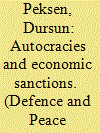

|
|
|
|
|
| Summary/Abstract |
There is some consensus in the literature that economic sanctions targeting authoritarian regimes are less effective than those against democratic regimes. This line of research, however, assumes that autocratic regimes are monolithic and that they have similar capacities to resist foreign pressure. This study argues that the success rate of sanctions against dictatorships is contingent on institutional differences across different types of autocracies. I develop a theoretical model indicating that single-party and military regimes are less likely to concede to foreign pressure compared to democracies. This is because they effectively use various repressive tactics and positive inducements to endure the costs of the coercion. Sanctions against personalist regimes, on the other hand, are likely to be as effective as sanctions directed at democracies. Personalist regimes might be inclined to acquiesce to foreign pressure due to their lack of strong institutional capacity to weather the costs of the sanctions. Results from the selection-corrected models show that sanctions against military or single-party regimes are less likely to induce concessions relative to democratic target regimes. The findings also indicate that there is no significant difference in the success rate of sanctions against personalist regimes and democratic governments.
|
|
|
|
|
|
|
|
|
|
|
|
|
|
|
|
| 2 |
ID:
186090
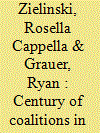

|
|
|
|
|
| Summary/Abstract |
Under what conditions do battlefield coalitions fight as greater or less than the sum of their parts? Introducing the Belligerents in Battle dataset, which contains information on actors fighting in 492 battles during interstate wars waged between 1900 and 2003, we present, for the first time, a portrait of the universe of battlefield coalitions. Battlefield coalitions win more often and suffer fewer casualties than belligerents fighting alone. Battlefield coalitions including forces fielded by the United States, states with pre-existing treaty agreements, and democracies are particularly powerful. By contrast, battlefield coalitions that include non-state actors lose the majority of their fights.
|
|
|
|
|
|
|
|
|
|
|
|
|
|
|
|
| 3 |
ID:
138783
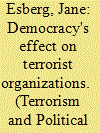

|
|
|
|
|
| Summary/Abstract |
How does democracy influence terrorism? The regime-responsive school argues that lack of representation in autocracies motivates violence; the regime-permissive school posits that individual liberty in democracies allows it. The schools thus disagree about the democratic feature to which violence responds—representation or individual liberty. These arguments are problematic in two ways. First, neither accounts for the potentially competing effects of different democratic features. Second, treating terrorism as a set response to operating context ignores the operational processes behind violence, described in organizational theories of terrorism. This article develops a bridge between the regime-responsive and regime-permissive schools by applying organizational theories of terrorism to their key arguments. I argue that representation and individual liberty have independent, and sometimes competing, effects on armed groups' missions, hierarchies, and membership—collectively organizational capacity, the ability to survive and influence the environment. This explains the mixed effects of democracy on terrorism: both high-functioning democracy and repressive autocracy weaken organizational capacity, but decreased representation in a democracy or higher individual liberty in an autocracy removes organizational stresses. New research on Chile between 1965 and 1995—representing five government periods, with four armed groups operating—acts as an initial test of these relationships.
|
|
|
|
|
|
|
|
|
|
|
|
|
|
|
|
| 4 |
ID:
170035
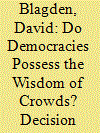

|
|
|
|
|
| Summary/Abstract |
What is it about democracies—if anything—that enables them to avoid war with each other while navigating conflictual international politics in pursuit of their own interests? Recent research in International Studies Quarterly by Brad LeVeck and Neil Narang (2017) provides an elegant new answer to this longstanding question. Drawing on “wisdom of crowds” logic—the insight that a large-enough group of inexpert judges is more likely to average towards an accurate estimate of a continuous variable than a smaller group, even when the smaller group contains relevant experts—supported by experimental evidence, they suggest that democracies’ strategic advantages lie in their large, diverse decision-making communities. If such crowd wisdom equips democracies to accurately assess others’ capabilities and intentions, so the argument goes, then they should be better than alternative regime types at maximizing their own interests while still avoiding the bargaining failure that is resort to war. Unfortunately, however, the politics of democratic foreign policy-making compromise the crowd-wisdom mechanism. This response article thus elucidates key flaws in the argument that crowd wisdom underpins democratic peace, before progressing to explain how the crowd-wisdom insight nonetheless carries important implications—irrespective of regime type—for strategic effectiveness.
|
|
|
|
|
|
|
|
|
|
|
|
|
|
|
|
| 5 |
ID:
093598


|
|
|
|
|
| Publication |
2010.
|
| Summary/Abstract |
This article aims to demonstrate that differences in the two major datasets can significantly affect the results of predictions of mass political killing. Mass political killing (such as Hitler's killing of some six million Jews, or the Rwanda genocide of 1994) has been studied for decades with the aid of valuable datasets measuring 'democide' and 'genocide and politicide', respectively. Without attempting to take sides as to whether one or the other is a more valid measure of the phenomenon of mass political killing, the authors aim in this investigation to see what independent variables best account for the onset of mass political killing, with the state-year as the unit of analysis. The predictor variables are level of economic development; types of war and violent unrest short of war; and regime type. By using a Cox proportional hazard model, the authors find that important regime effects either appear or disappear depending on the dataset used, with regime generally having a significant effect on onset of democide, but not having a significant effect on onset of geno-politicide. It is important for the scholarly community to be aware of these dataset effects, which may be the source of some of the most important existing controversies in the literature on explaining mass political killing.
|
|
|
|
|
|
|
|
|
|
|
|
|
|
|
|
| 6 |
ID:
138837


|
|
|
|
|
| Summary/Abstract |
Reporting bias – the media’s tendency to systematically underreport or overreport certain types of events – is a persistent problem for participants and observers of armed conflict. We argue that the nature of reporting bias depends on how news organizations navigate the political context in which they are based. Where government pressure on the media is limited – in democratic regimes – the scope of reporting should reflect conventional media preferences toward novel, large-scale, dramatic developments that challenge the conventional wisdom and highlight the unsustainability of the status quo. Where political constraints on reporting are more onerous – in non-democratic regimes – the more conservative preferences of the state will drive the scope of coverage, emphasizing the legitimacy and inevitability of the prevailing order. We test these propositions using new data on protest and political violence during the 2011 Libyan uprising and daily newspaper coverage of the Arab Spring from 113 countries. We uncover evidence of a status-quo media bias in non-democratic states, and a revisionist bias in democratic states. Media coverage in non-democracies underreported protests and nonviolent collective action by regime opponents, largely ignored government atrocities, and overreported those caused by rebels. We find the opposite patterns in democratic states.
|
|
|
|
|
|
|
|
|
|
|
|
|
|
|
|
| 7 |
ID:
141060


|
|
|
|
|
| Summary/Abstract |
Over the past decade, there have been increased attempts to understand the contributing factors to the relationship between healthy populations (that is, populations that have long life expectancy from birth), the prevention of conflict, and governance regimes that enable ‘healthy nations’ to survive and thrive. These studies have been largely informed by longitudinal studies on the positive relationship between regime type, provision of health care, and conflict prevention. This article examines what insights a comparison of postconflict countries in a regional setting may provide to challenge or indeed extend the findings advanced so far in the literature on the relationship between regime type and health insecurity. The Southeast Asian experience confirms the obvious – that the cessation of armed conflict is related to improved health outcomes. However, it challenges presumptions that democratisation plays a significant role in shaping this relationship.
|
|
|
|
|
|
|
|
|
|
|
|
|
|
|
|
| 8 |
ID:
151711


|
|
|
|
|
| Summary/Abstract |
The empirical international conflict literature has given much recent attention to interstate armed force’s impact on human well-being. While empirical research has advanced our understanding of the phenomenon considerably, we argue that one conclusion that many studies have reached is preliminary. Some recent research contends that only full-scale war, and not force short of war, has a discernable impact on human welfare or physical quality of life (PQOL). We develop theory on one type of force short of war, large-scale foreign military intervention (FMI), and its potential effects on PQOL. Using interrupted time series and panel corrected standard error methodologies, we find that from 1960 to 2005 large-scale FMI had a statistically and substantively significant impact on the PQOL of populations in 106 developing countries. The specific effect that this type of armed force has depended in large part on the regime type of the target country.
|
|
|
|
|
|
|
|
|
|
|
|
|
|
|
|
| 9 |
ID:
138866
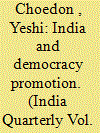

|
|
|
|
|
| Summary/Abstract |
When the Western countries confronted backlash in their promotion of democracy, they wooed India to join them. India has shown reluctance to join them due to various factors. It starts with discussion of how it was inconceivable for India to promote democracy during the Cold War and then examine factors that made India reticent to commit itself to democracy promotion in the post-Cold War. The paper discusses the reasons as to why a nuanced shift towards supporting democracy promotion has taken place in the turn of the Century and how this shift is made with the intention of making a difference through participation rather than openly protesting and standing aloof on principle ground. The main focus of the paper is to highlight how India provides democracy assistance differently from that of the Western countries and what kind of tangible assistances India provided to those who sought. It highlights how, keeping in view the sensitivity of sovereignty among the developing countries, India uses term such as ‘democracy assistance’ or ‘democracy support’ instead of ‘democracy promotion’ and how it adopts policy of providing democracy assistance only when requested and it follows top-down approach, dealing mainly with the sovereign states and their institutions. It ends with an emphasis on the value addition of having diverse approaches to spreading democracy.
|
|
|
|
|
|
|
|
|
|
|
|
|
|
|
|
| 10 |
ID:
138306


|
|
|
|
|
| Summary/Abstract |
How and why do regime type and interstate war affect government spending? We argue that a political leader allocates scarce resources between social and military expenditures as a function of their relative efficiency in securing her political survival. We derive four hypotheses concerning how mobilization for and demobilization from interstate war affects government spending differently in democratic and autocratic regimes. Compared to democracies, autocracies should increase military spending to a greater degree during wartime and decrease military spending to a greater extent following a war. Autocracies also should cut social spending more during an interstate war and increase social spending more during the process of demobilization from war than democracies. Our analyses of all states in the international system from 1950 to 2001 yield support for our hypotheses.
|
|
|
|
|
|
|
|
|
|
|
|
|
|
|
|
| 11 |
ID:
118175
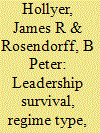

|
|
|
|
|
| Publication |
2012.
|
| Summary/Abstract |
Preferential trade agreements (PTAs) limit member-states' trade policy discretion; consequently, policy uncertainty is mitigated. Reductions in policy uncertainty stemming from accession to a PTA improve the resource allocation decisions of the voters and reduce deadweight losses from the need to self-insure against policy uncertainty. The resultant increase in efficiency improves an incumbent government's-particularly a democratic government's-chance of surviving in office. We test this prediction using survival analysis, adjusting for potential selection biases using propensity score matching. We find robust support for the proposition that governments that sign PTAs survive longer in office than observationally similar governments that do not sign. In addition, we find that this effect is stronger in democracies than in autocracies.
|
|
|
|
|
|
|
|
|
|
|
|
|
|
|
|
| 12 |
ID:
156710


|
|
|
|
|
| Summary/Abstract |
This paper explores the question of how major powers signal support for their protégés. We develop a theory that explains why major powers show support for some protégés using highly visible “frontstage” signals of support, while supporting other protégés through less visible, but nonetheless costly, “offstage” signals. From an international strategic perspective, it is puzzling that major powers do not always send the most visible signal possible. We argue that this can be explained by considering the domestic environments in which the leaders of major powers and protégés operate. Focusing particularly on the United States as we develop our theory, we argue that the US will prefer to send offstage signals of support for more autocratic protégés for several reasons. First, sending frontstage support signals for autocracies would expose US leaders to charges of hypocrisy. Second, frontstage signals of support for autocracies face an impediment to credibility because of the public backlash in the United States that overt support for dictators could generate. Third, many autocratic protégés would be reluctant to accept a frontstage signal of support from the US because it could undermine their regime stability. We test our theory in a data set that records various support signals sent by the United States for other countries between 1950 and 2008, finding strong support for our expectations. We also find evidence of the causal mechanisms posited by our theory in a case study of relations between the US and the Shah's Iran.
|
|
|
|
|
|
|
|
|
|
|
|
|
|
|
|
| 13 |
ID:
188020
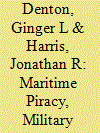

|
|
|
|
|
| Summary/Abstract |
West African security threats have become more frequent in recent years, most notably in the Gulf of Guinea. As increasing quantities of the world’s trade pass through the maritime domain, ship hijackings and other maritime criminal activities have garnered widespread attention from the international community. The International Maritime Bureau reports 785 piracy incidents have occurred in the region since 2000 and current models forecasting worldwide piracy trends have failed to accurately predict maritime crime in all of the West African states. The purpose of this article is to provide an analysis of piracy developments in the Gulf of Guinea. The authors argue that increased military capacity and anocratic regimes lead to increases in piracy while failed states are associated with a decline in such maritime crimes. Data from 2000 to 2016 is used to empirically test this claim. The analysis shows that a state’s military capacity has no impact on the prevalence of piracy events while institutional frameworks and regime type influence the degree and number of maritime attacks off the coast of West Africa. The results imply that institutionally strong and democratic regimes are less likely to experience piracy in the Gulf of Guinea than weak states or anocracies.
|
|
|
|
|
|
|
|
|
|
|
|
|
|
|
|
| 14 |
ID:
139213
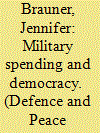

|
|
|
|
|
| Summary/Abstract |
This paper examines empirically whether democracies allocate fewer resources to the military than dictatorships. It employs a panel of up to 112 countries over the period 1960–2000 to estimate a standard demand for military spending model. While papers on the determinants of military spending generally include democracy as a control variable, with a few exceptions, it is not the focus of their enquiry. This paper addresses resulting problems in the existing literature concerning data quality and the appropriate measurement of key variables, as well as the question of causality between military spending and democracy. It finds that democracies spend less on the military as a percentage of GDP than autocracies do and that causality runs from regime type to military spending.
|
|
|
|
|
|
|
|
|
|
|
|
|
|
|
|
| 15 |
ID:
189899


|
|
|
|
|
| Summary/Abstract |
Do democratic or non-democratic countries contribute more personnel to UN peacekeeping operations? While earlier studies found that democracies make larger contributions than non-democracies, recent research has challenged these findings. Scholarship in this area, however, has largely conceived of ‘non-democracy’ as a monolithic category, despite a growing body of research delineating distinct types of illiberal regimes and identifying their divergent behaviours in a range of domestic and international contexts. In this article, I argue that non-democracies’ personnel contributions to peacekeeping operations vary based on different ‘type’ of illiberal regime, and that this variation is contingent on two main factors: the influence of the military within the regime, and the extent to which a regime values the prestige associated with large-scale peacekeeping contributions. I test this proposition by statistically analyzing data from UN peacekeeping operations between 1991–2018. The findings indicate that single-party regimes are likely to make significantly smaller contributions than democracies; the contribution behaviour of other types of non-democracies is less discernible from their democratic counterparts.
|
|
|
|
|
|
|
|
|
|
|
|
|
|
|
|
| 16 |
ID:
176803


|
|
|
|
|
| Summary/Abstract |
In its first generation, the literature on the resource curse typically posited that resource dependence shapes a country's economy and politics. More recent work posits that the effects are mediated by institutions. We take this newer approach further by arguing that economic and political institutions not just mediate but actually shape resource dependence. Our focus is on performance across national oil companies (NOCs) in Latin America. We explain performance variation by invoking variations in regime and market features. NOCs that operate in contexts of greater independence from the Executive Branch (stronger checks and balances within and outside the sector) and greater market forces—though not necessarily private actor dominance—exhibit better performance. Institutions thus influence sector conditions, rather than the other way around. We advance this argument using original data from Colombia and Venezuela, and supplementary data from Mexico, Brazil, and Argentina. Our study focuses on the oil boom-bust cycle of 2003–2016.
|
|
|
|
|
|
|
|
|
|
|
|
|
|
|
|
| 17 |
ID:
143635
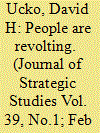

|
|
|
|
|
| Summary/Abstract |
Rather than win hearts and minds, authoritarian counterinsurgency is said to rely heavily on coercion. It has a reputation for effectiveness, if also for its amorality. Still, the research into authoritarian counterinsurgency is surprisingly lacking. By distilling common features from key cases, this article concludes that this approach goes beyond the indiscriminate violence that typically captures the imagination. Like their democratic counterparts but differently, authoritarian regimes also engage in mobilisation, create narratives, and turn military advantage into political gain. The analysis explains how these tasks are undertaken and, by contradistinction, sheds light on more liberal approaches as well.
|
|
|
|
|
|
|
|
|
|
|
|
|
|
|
|
| 18 |
ID:
155190
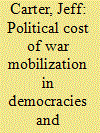

|
|
|
|
|
| Summary/Abstract |
Recent research concludes fighting or losing an interstate war is not costlier for democratic leaders than dictators, which implies most of our institutional explanations for differences in conflict behavior across regime type rest on empirically tenuous assumptions. I argue military mobilization, a fundamental but often overlooked aspect of war, should be costlier for democrats than dictators. Waging interstate war is associated with higher military spending and, often, lower social spending. Variation across regime type in the representation of the general public, civilian elite, and military in leaders’ winning coalitions should make democrats more likely than dictators to lose power given wartime patterns of government spending. This argument finds support during the period from 1950 to 2001. My findings provide microfoundations for a number of existing empirical results and suggest that differences in the conflict behavior of democracies and dictatorships should be largest when waging war requires a significant mobilization effort.
|
|
|
|
|
|
|
|
|
|
|
|
|
|
|
|
| 19 |
ID:
091611
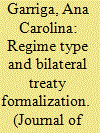

|
|
|
|
|
| Publication |
2009.
|
| Summary/Abstract |
How does domestic regime type affect bilateral cooperation, and one of its most visible manifestations, bilateral treaties? This article explains how domestic political regime affects bilateral cooperation and, contrary to the expectations of some scholars, why autocracies should be expected to be more likely than democracies to enter into bilateral treaties. If the preferences of a pair of states are not identical, the sets of agreements that each party would consent to (win-sets) need to overlap for a bilateral treaty to be acceptable. Because additional domestic constraints reduce the size of a country's win-set, autocracies should have broader win-sets than democracies. Therefore, autocratic dyads should be more likely to formalize bilateral treaties than other pairs of states. Based on an original data set, I present empirical evidence showing that pairs of autocracies are more likely than other pairs of states to enter into agreements formalizing bilateral cooperation.
|
|
|
|
|
|
|
|
|
|
|
|
|
|
|
|
| 20 |
ID:
152864
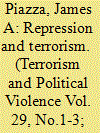

|
|
|
|
|
| Summary/Abstract |
While some scholars have theorized that repression reduces terrorism because it raises the costs of participating in terrorist activity by dissidents, others argue that repression stimulates terrorism by either closing off nonviolent avenues for expressing dissent or by provoking or sharpening grievances within a population. This study investigates these contradictory sets of expectations by considering whether or not different specific types of repression yield different effects on patterns of terrorism in 149 countries for the period 1981 to 2006. By assessing the impact of nine specific types of repression on domestic terrorism, the study produces some interesting findings: while, as expected, forms of repression that close off nonviolent avenues of dissent and boost group grievances increase the amount of domestic terrorism a country faces, types of repression that raise the costs of terrorist activity have no discernible suppressing effect on terrorism.
|
|
|
|
|
|
|
|
|
|
|
|
|
|
|
|
|
|
|
|
|